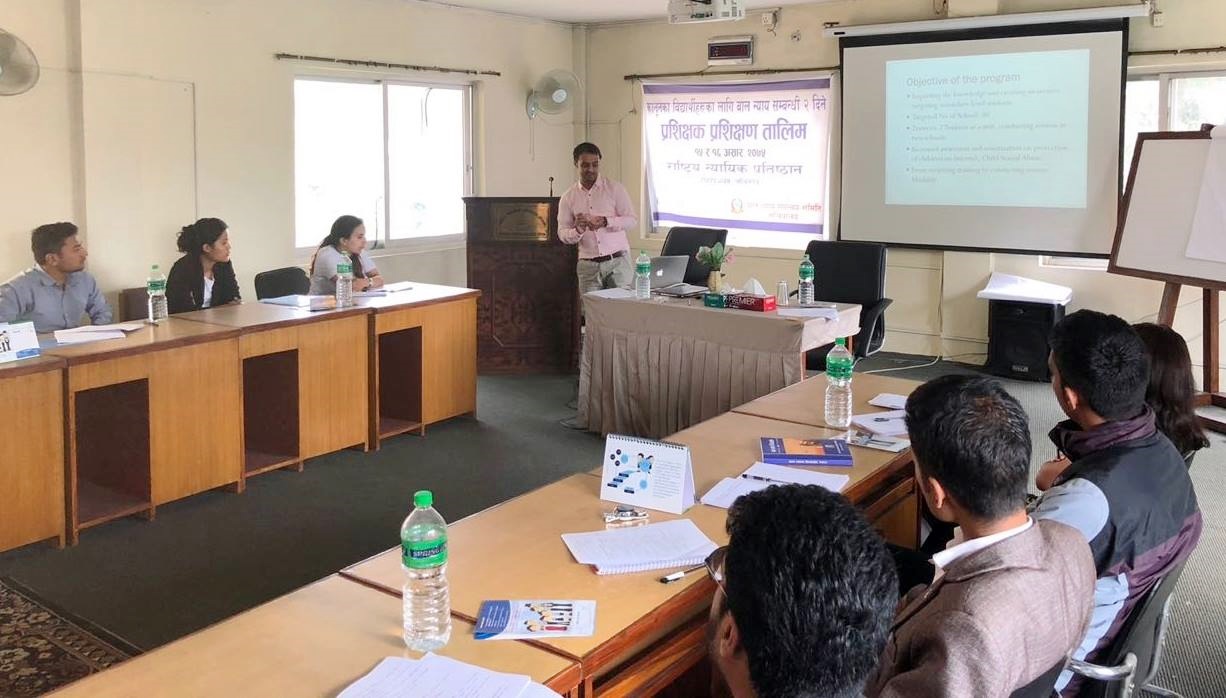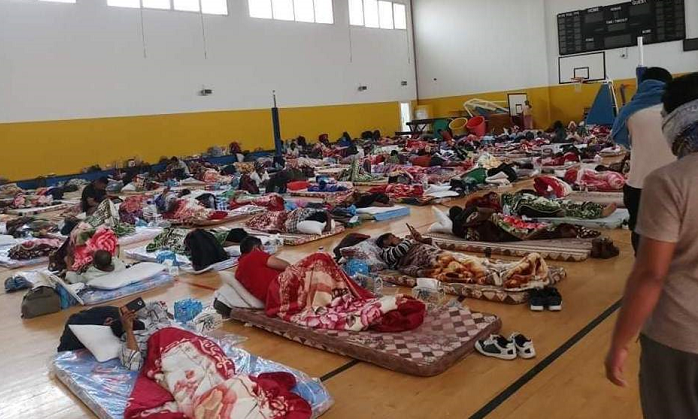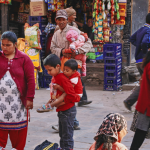‘I believe that if all South Asian countries come together to bargain collectively with destination countries on workers’ rights en bloc, the result will be far more successful than each country demanding improved rights for workers of its own nationality.’
Barun Ghimire is a human rights lawyer and Senior Legal Officer at iProbono, Nepal. He works on socio-economic rights and has been at the forefront of strategic litigation to protect migrant workers’ rights in Nepal. In this interview with Madhulika, Junior Program Officer at iProbono, Barun discusses his motivations for choosing law as a career, the lawyers who have inspired him and his work at iProbono.
Barun, who has worked extensively on issues concerning migrant workers, speaks about the difficulties faced by migrant workers of different nationalities in the run-up to the FIFA World Cup in 2022 at Qatar. He makes the case that the best way of securing labour rights for migrant workers in destination countries is by bringing together all South Asian countries as a united front to lobby for increased protections.
Later this year, Barun will be travelling to the US for a year-long professional leadership development fellowship – Community Solutions Program sponsored by the United States Department of State.
What motivated you to become a lawyer, more specifically a human rights lawyer?
I wanted to pursue a reputed career, which imbibed social values. Law was a combination of the two. This drew me to law school in 2005, even though it was not the preferred career choice at the time. Back then, medical studies, business studies, and engineering were in high demand; however, the tide has since changed, and now law is the preferred choice for many in Nepal.
My interest in human rights developed when I joined the Economic, Social, and Development Rights Winter Residential School led by the Kathmandu School of Law. The program was a week-long extensive course, with a special focus on socio-cultural, economic and development rights. My learning from this course made me realise how economic, social and development rights issues are often sidelined in the mainstream human rights regime. During the program, I received the “Nation’s Best Future Human Rights Lawyer Award,” which was a huge source of motivation for me to pursue human rights law as a career.
I went on to pursue human rights as a specialisation during my master’s degree after realising that I wanted to further my academic and professional career in human rights.
Who are the human rights lawyers you admire?
Two human rights lawyers who I admire are the American Civil Rights Lawyer Bryan Stevenson of the Equal Justice Initiative and Iranian Human Rights Lawyer Shirin Ebadi, who founded the Defenders of Human Rights Centre in Iran.
Bryan Stevenson has been at the forefront of defending death-row inmates in the United States and has been involved in cases that have advanced minorities’ rights in the criminal justice system. For me, Bryan Stevenson is the real-life Atticus Finch. The difference he is making on an individual level, and in the same vein, exposing structural injustice is remarkable. His story is a reflection of how much difference a single person can make.
Shirin Ebadi, a Nobel Laureate, has taken up the cause of many political dissidents in Iran, apart from litigating for women’s and child rights. Her story is an inspiration to those who want to help others as well as motivating and strengthening those who work in challenging/hostile environments. Ebadi’s fascinating book – Until We Are Free: My Fight for Human Rights in Iran – where she documents her struggle practising human rights in Iran as a woman – is a rewarding and enriching read for anyone who wishes to pursue human rights.
Both Stevenson and Ebadi are deeply committed to their clients and have fought vehemently for them, often at great personal risk. Both of these people inspire me, and I often look back to their work for inspiration.
Nepal adopted a new constitution in 2015, hailed by many as progressive and forward-thinking. What do you think the most valuable aspects of this document are? Do you think that the progressive values it espouses have had an impact on court judgments or the larger society in Nepal?
Nepal’s Constitution is interesting for many reasons. One is the process by which the Constitution was drafted. Nepal elected a Constituent Assembly, which was responsible for bringing the Constitution to reality. In a true sense, the Nepali Constitution was drafted by the representatives of the people, and this is evident from the text of the Constitution which is filled with aspirations for economic and social justice.
Any Constitution is a work in progress, so it is encouraging that the Nepali Constitution has huge aspirations and guarantees a wide range of fundamental rights. However, if the Constitution fails to deliver on its promise and the rhetoric can’t be turned into reality, the very sanctity of the Constitution will be called into question.
The Nepalese Constitution is a forward-thinking, progressive document. It now requires the government’s commitment to ensure its proper implementation so that its principles can flourish rather than perish. So far, Nepal has fared fairly well in implementing the Constitution. For instance, the Constitution established Nepal as a federal, social, secular democratic republic with three tiers of government – local, provincial, and federal. Despite this being a huge transformation for Nepal which was previously a unitary country, the institutionalisation of federalism has been smooth so far.
However, more efforts are required to guarantee fundamental rights, particularly socio-economic rights. How successful the implementation of these rights are, will determine how successful the Constitution can be.
What have been the highlights and emphasis of your work at iProbono?
When iProbono began its work in Nepal in 2018, the country had just adopted its new Constitution with many promising features. The Constitution made socio-economic rights justifiable in the court of law and made provisions for legislation to enable it. We at iProbono worked on a legislative review of these provisions with local lawyers and conducted capacity building for lawyers so that they could litigate these rights. We believed that these initiatives would help in the implementation of the Constitution and in strengthening the capacity of the legal community.
Much of our work in Nepal has and continues to involve working with young lawyers on socio-economic rights. We have conducted legal writing workshops and discussions with young lawyers, giving them the opportunity to interact with experts from different fields and gain a diversity of perspectives. We are currently developing strategic litigation on a variety of socio-economic rights, which will enable proper implementation of the promises and commitments made in the Constitution.

Barun Ghimire, iProbono’s Senior Legal Officer conducted a session on ‘Child Justice System’ at the Training of Trainers program organised by the Child Justice Coordination Committee in Nepal in 2018.
In 2021, iProbono filed a Public Interest Litigation relating to decriminalisation of abortion in Nepal. This was a significant step – in the sense that it will play a vital role in the implementation of Sexual and Reproductive Health Rights provided for as fundamental rights in the recent constitution of Nepal. Even though the prior constitution provided reproductive healthcare as a fundamental right, which has further been upheld by the Supreme Court of Nepal in 2007, it has not been achieved in a true sense. This is mainly because Nepal’s legislation providing for this specific issue is not right-based and reflects the deep-rooted patriarchal notions of the legislators. Nepal still criminalise abortion in general with certain exceptions under the Country Criminal Code (2017) and Safe Motherhood and Reproductive Health Act (2018).
iProbono’s 2021 petition seeks to change this by petitioning the court to exclude abortion from the purview of criminal law, thus changing the narrative that “abortion is a crime but with some lawful exception.” We are now joining hands on this petition with the Forum for Women, Law and Development and the Center for Reproductive Rights in Nepal – both organisations have been advocating for years on this issue and are experts in the field of reproductive rights.
iProbono also works in partnership with the Law and Policy Forum for Social Justice (LAPSOJ) to further the rights of migrant workers and their families. During COVID, we filed a case before the Supreme Court on the “right to return” to establish the right of persons to return to their home country without any restrictions as a fundamental human right.
A substantial part of your work in Nepal concerns migrant workers. In your opinion, what are some of the urgent concerns migrant workers from Nepal face?
When I talk about migrant workers in Nepal, I’m referring to migrant workers who travel outside Nepal to work in other countries except India (the law of Nepal excludes migration to India for work from the definition of the term). The State actively promoted foreign labour migration as a state policy initially, as they didn’t want the youth to be involved in insurgency. Twenty years ago, when a legislation was enacted to regulate foreign migration, it wasn’t concerned with labour rights of migrants; rather, it was concerned with managing foreign migration as a business.
This led to a situation where migrant workers were not considered as right holders. Given that these workers were not within the jurisdiction of Nepal, their rights were always overlooked. While some people believed their issues were not a priority at home, for others their struggle was simply invisible. Being foreigners in destination countries, their hardship was largely unseen and ignored there as well, making them an invisible workforce with no rights in either country.

Nepali Migrant Workers: Desperate to Return Home (Photo: South Asia Times)
As labour migration flourished over the years, several issues came to the forefront. Recruitment abuses, exploitation at the workplace, lack of basic rights are some common and prevalent concerns. Recruitment abuse typically involves charging large sums of money from workers. This is contrary to the general zero cost recruitment principle as per which employers are expected to remove the cost burden on overseas migrants by incurring the costs attached to their travel, including visas, tickets, etc. To be able to pay such high recruitment fees, workers from lower socio-economic backgrounds are often forced to incur substantial debt. Despite paying substantial sums of money, workers don’t get the promised job; their working conditions are contrary to what is promised; or there is a significant gap between the promised and actual salary. Oftentimes, their passports are taken away, resulting in a system of bondage where workers are unable to escape their employer even if they are abusive.
Working conditions in destination countries are frequently not up to par with international labour standards. Human trafficking is sometimes carried out under the pretence of labour migration. There have also been numerous reports of employees dying while travelling to gulf countries. The majority of deaths could have been avoided.
What kind of cases have you filed on behalf of migrant workers before the Nepal Supreme Court? How has the Court responded?
The majority of my work on the rights of migrant workers is conducted through LAPSOJ. The focus of the work is to advance policy changes to assist migrant workers.
One of my first cases concerned securing voting rights for migrant workers. Since politicians are largely indifferent to the plight of workers, we believed that giving a voice to these workers might spur decision makers into taking action, given that the migrant worker community forms a huge vote bank for political parties. Voting rights, we believed, would ensure better government accountability for workers. We organised a consultation with the workers and other relevant stakeholders, following which we petitioned the Supreme Court of Nepal requesting that the government pass a legislation enabling migrant workers working abroad to vote. The Court responded positively to our petition, and extended voting rights not just to migrant workers but to anyone who is a Nepali national living outside the country. The Court also directed the Government to make all necessary arrangements to ensure that migrant workers are able to vote.
Another important case we instituted was on the alarming number of deaths of migrant workers in destination countries. A recent study revealed that many of these deaths could have been avoided, and were caused due to the negligence of recruitment agencies and companies who hired them to work. These workers died mainly due to lack of preparation, including lack of information on climatic conditions in destination countries and other basic health directives. In 2020, the Supreme Court responded to our petition with utmost urgency and ordered the Government to work on minimising the risk of deaths of Nepali migrant workers. The Supreme Court also issued comprehensive directions for the Government to follow including conducting a compulsory post-mortem in case of death of migrant workers in the destination country (or in Nepal, if not conducted there) to understand the cause of death and take measures to prevent it, facilitating transportation of the dead body to Nepal in a dignified manner among others.
We also filed an important case on the right to legal aid for migrant workers in destination countries. Many migrant workers did not have legal representation when they came in conflict with the law in destination countries. We argued that it was the obligation of the Nepali government to provide legal aid to migrant workers. We are awaiting the full text of the judgement in this matter.
Our most recent case concerned migrant workers from Nepal sentenced to death penalty in destination countries. Despite Nepal being a signatory to the second Optional Protocol to the International Covenant on Civil and Political Rights, which abolishes the death penalty, the country lacks provisions on the subject. Our contention was that Nepal has a positive obligation to take necessary measures to prevent the death penalty from being used against Nepali nationals in other jurisdictions. We received a positive verdict from the Supreme Court.
The Supreme Court has largely been positive and responsive to our petitions and has passed good orders. However, the question of implementation still remains. In many cases, the judgments are yet to be implemented.
Several human rights organisations have highlighted the plight of migrant workers – many of whom are Nepali – involved in piecing together the FIFA World Cup in Qatar which will take place this year. In your opinion, what are the most pressing issues concerning migrant workers working in Qatar for the World Cup, and how do you think these issues may be addressed?
The working conditions of migrant workers involved in bringing together the FIFA World Cup in Qatar are very dire. Several international organisations like Amnesty International, Human Rights Watch and Business and Human Rights Center, have documented extensive labour violations of workers working in FIFA related facilities, ranging from forced labour, non-payment of wages, exorbitant recruitment fees to workplace injuries and even deaths. Reports state that over 6500 workers have died in Qatar since it won the rights to host the World Cup 10 years ago.
Though the labour violations of migrant workers in Qatar have been extensively reported by the international media, and the Qatar government has taken steps to improve labour standards by increasing minimum wages of workers and introducing new laws that allow workers to freely change their jobs and leave the country without the permission of their employers, these measures are not enough. Labour violations in Qatar are systemic and require the full implementation of the laws introduced by the Qatar government to improve labour standards.
The 2022 World Cup in Qatar demonstrates that migrant workers of different nationalities face similar issues. How do you think the international community can unite to advocate for the rights of migrant workers ?
When migrant workers reach a destination country, they aren’t identified by their individual nationality and are instead seen more broadly as South Asian workers. As a result, the fate of all South Asian workers is the same in destination countries. I believe that if all South Asian countries come together to bargain collectively with destination countries on workers’ rights en bloc, the result will be far more successful than each country demanding improved rights for workers of its own nationality. For instance, when questions on recruitment fees were raised in Nepal, the counter argument from recruitment businesses was that if they did not agree to the employer’s terms, the employer would merely move recruitment to Bangladesh. This would mean fewer jobs for Nepalese citizens and lower remittances to the country. The only way to fight such threats is for all South Asian countries to bargain collectively.
Also, the steps taken and efforts made towards holding FIFA and Qatar accountable need to be amplified and supported.
What are your future plans?

Barun Ghimire, Senior Legal Officer, iProbono Nepal.
Starting August 2022, I will be a part of the Community Solutions Program – a year-long professional leadership development program sponsored by the United States State Department. The program is meant for people working to improve their communities on issues related to the environment, peace and conflict resolution, transparency and accountability, and women and gender. Following the completion of this program, I intend to return to Nepal and continue iProbono’s litigation work. iProbono seeks to engage more in direct litigation and establish a solid foundation for the implementation of constitutional values in Nepal in the future.
Previously, I used to teach part-time and had taken a break from teaching human rights, I am also thinking about getting back to teaching in the near future.
Madhulika T – Junior Program Officer, iProbono India.







